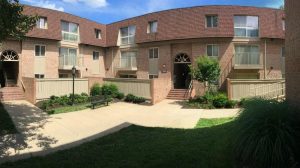
December 5, 2018 – The old boilers at Cider Mill Apartments were inefficient, cumbersome and had to go.
The new owners of the 864-unit, garden-style community in Montgomery Village, Maryland were glad the property was in good shape overall, but soon after their 2014 purchase they planned upgrades to common spaces, the grounds and mechanical, electrical and plumbing systems.
“The most significant part of the renovation project was to convert Cider Mill’s antiquated two-pipe heating and cooling systems to individually metered, high-efficiency electric cooling and high-efficiency gas heat and hot water systems,” says Scott Altman, executive vice president of Rockville, Maryland-based full service real estate management and investment company, The Donaldson Group.

The Donaldson Group spent four to five months exploring its conversion options, “and we are sure glad we did,” Altman says.
The company reached out to Washington Gas to see whether there was anything the utility provider could do to make the conversion process easier. What The Donaldson Group learned led it to abandon its original strategy, which involved heavy use of electricity instead of gas.
“It was nothing but good news from Washington Gas,” Altman says.
The Donaldson Group was able to take advantage of Washington Gas’ Multifamily Incentive Program to offset the cost of installing individual natural gas utility meters.
“What this meant for Cider Mill was that the Multifamily Incentive Program could potentially cover all the costs associated with running the gas lines from the new meters to the individual units,” Altman says – an incentive that added up to $1.2 million for The Donaldson Group. That was in addition to a $155,000 rebate the company received from Washington Gas’ energy savings program for the installation of high-efficiency water heaters.
“While it was difficult to find the right person at the power company to discuss a conversion, it was more difficult establishing a meeting with them. Conversely starting a dialogue with Washington Gas was very easy and the folks there were very responsive – it was almost like they worked for us,” Altman says.
The total renovation project was completed in 12 months, about half of the project’s original timeline, and at no time did a resident experience a utility interruption, Altman says.
“Washington Gas was quick to do their work – they were in and out within three months,” he says. “The work was completed in a very professional manner and all landscaping was restored to what was there prior to the work or better.”
In the end, by spending just over $7 million in capital, The Donaldson Group added $20 million to the value of Cider Mill.
Often, developers see the up-front costs of designing with gas as a challenge. But in the long run, using natural gas saves the property owner and tenants money. Developers of new construction and owners of asset reposition projects should keep Washington Gas’ Multifamily Incentive Program in mind when estimating project costs. The incentive can reduce the costs of installing individual gas utility meters by an average of $1,000 per unit, and sometimes that amount can range higher.
To be eligible, projects must be in Washington Gas’ service territory and have four or more units. It is recommended that the project be in the pre-design phase and include gas heating, hot water and cooking to maximize cost savings. However, individually metering with one or two natural gas appliances may qualify for the MIP as well. Eligible incentive amounts vary by project and are determined after the project completes Washington Gas’s cost-benefit lifecycle evaluation.



